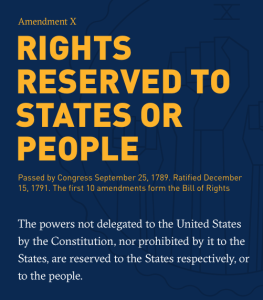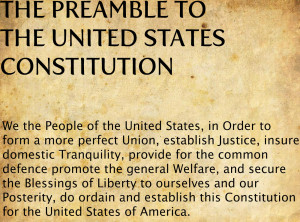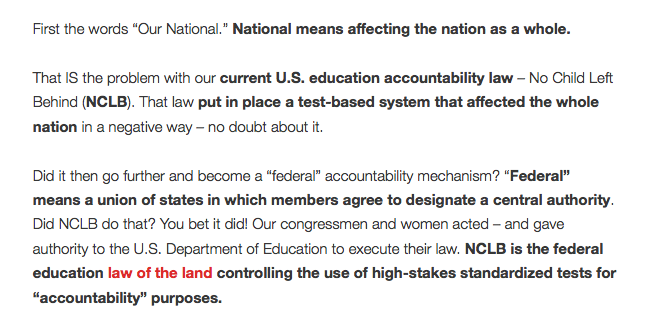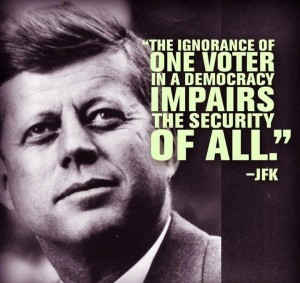Education is not mentioned in the Constitution…. We have heard how this argument goes.
Because of no specific mention of education, the responsibility for educating the young people of our republic is deferred to the States in the 10th Amendment …. with the caveat “or to the people.”
People, you need to decide. Is public education a national issue?
If we never have that discussion, then we never examine the arguments that have been stalling our progress in education reform for the last three decades.
And, we must look back at the historical precedents surrounding the issue of federal support for public education.
How do we make informed decisions without this conversation?
State versus Federal: Are we sure we should be fighting that battle?
The Constitution doesn’t mention a whole lot of things — by design.
“The original Constitution of 1788 contained very few specific restrictions on the ways in which the power of the national government could be exercised against the people.”
And,..
“…the state delegations at the Constitutional Convention voted 10-0 against including a bill of rights in the Constitution.”
One reason they gave for being against such specific rights being in this governing document is
“…any list of rights would be incomplete. Such a list might indirectly endanger any rights not included on it.”
 That is really something to think about. Has the argument over State versus Federal law governing education actually endangered the general Welfare of the children in our nation?
That is really something to think about. Has the argument over State versus Federal law governing education actually endangered the general Welfare of the children in our nation?
The 10th Amendment …
“— emphasizes that … the fundamental character of the national government… remains a government of limited and enumerated powers, so that the first question involving an exercise of federal power is not whether it violates someone’s rights, but whether it exceeds the national government’s enumerated powers.”
Note in that quote that the authors interchange the words “national” and “federal.” Unfortunately — but fortunately for the country — the Founding Fathers understood the differences, chose to make our constitution a unique blend of those concepts, but it appears they made the assumption that our representatives (and the populous) would forever understand and make distinction between the two concepts. For example…

From blog post titled “Fixing Our National Accountability System: Part 1.”
The Founding Fathers seemed to have also assumed that there would always be open debate and deliberation especially in the Senate.…anyway….
Let’s consider how our predecessors sorted things out when confronted with issues concerning education. Starting pre-Constitution…
1784 — Land Ordinance — This was outlined by Thomas Jefferson while we were still floundering under the Articles of Confederation because “Congress did not have the power to raise revenue by direct taxation. Therefore, the immediate goal of the ordinance was to raise money through the sale of land…”
“The ordinance was also significant for establishing a mechanism for funding public education. Section 16 in each township was reserved for the maintenance of public schools. Many schools today are still located in section sixteen of their respective townships…”
Education was a national issue then.
1787 —September 17— the Constitution was signed.
1789 — President George Washington signed the Northwest Ordinance, which established (among other things) “the precedent by which the federal government would be sovereign,” it designated “prohibition of slavery” in the [new] territories, and it stated (Art. 3) that “schools and the means of education shall forever be encouraged.”
Under our new constitution and through the Northwest Ordinance, our new nation made a statement of national support for education and its importance as well as inching us ALL towards individual freedom and equal opportunity.
1841/1848 — Congress made grants of land to support public education.

The History Of Federal Government In Public Education: Where Have We Been And How Did We Get Here? League of Women Voters
Education remained a national issue.
1862 — The First Morrill Act (Land Grant Act) was passed granting public lands to support one college per state for specific purposes.
1867 — Original “Office” of Education was established and, in 1890, the Second Morrill Act “gave the Office of Education responsibility for administering support for the original system of land-grant colleges.”
Obviously, there is a pattern of federal support for public education and many more laws followed that have supported educating the nation —very well. (Don’t forget the GI Bill.)
What is missing in kicking off a national conversation now is what John F. Kennedy was very careful to discuss when he proposed the ideas behind what became the Elementary and Secondary Education Act (ESEA) of 1965. Can the federal government give aid to the nations’ public schools without exerting “control” over them? The answer is yes.
What do our representatives and political candidates now have to say about the proper role of the federal government in education? Can they even tell you what was wrong with NCLB? After all these years, do they have anything specific to say about correcting their mistake? Do they not see how they crossed the line into federal CONTROL versus SUPPORT?
Today, the public is accepting the idea that if politicians say “I support universal preschool” or “community college should be free” that it means they care about supporting the K-12 public education system. That isn’t the case.
K-12 education is the playing field best positioned to offer all kids a chance to explore and fulfill their personal potential. The long-term benefits of preschool without K-3 improvements is still debatable. And, should we really be investing in free community college to make up for what we didn’t do in K-12? How efficient is that?
Did you know we have never provided the funding requested for K-12 disadvantaged students through ESEA Title I? Where’s that conversation taking place?
When the federal policy of the last 15 years undermines the very foundation of K-12 public education — like No Child Left Behind has, does, and continues to do eight years after it should have gone away — that says the lawmakers don’t care.
When the country doesn’t push for the right supports for educating children, what does that say about us?
No deliberation, no debate, no demands, no progress.
End of the road for real national support for public education? Or time to raise the issue to a new level?
According to the 10th Amendment, the people have the power.




“Can the federal government give aid to the nations’ public schools without exerting ‘control’ over them? The answer is yes.”
But *should* they? The answer is no. First, there is the greed and love-of-money factor. There will always be certain individuals in positions of power who confiscate funds for their own purposes, vs depositing it where it is needed and was intended to go. If there is no ‘control’, there are no checks and balances for fiscal accountability.
Secondly, there has to be some means of measurement to determine if the investment has been successful – and that means testing. Like it or not. NCLB was created in an attempt to “lift” those children who were not receiving a good education to the level of those who are. You can see the variations clearly in most state-by-state comparisons. The problem with NCLB is not that it was a bad idea – it’s a great concept; it’s that it was not implemented in stages, one grade level at a time, allowing those children who entered into it as K’ers to continue, one grade at a time, and thus not penalize those in higher grades by expecting them to hit the bar without the same step-by-step preparation.
If you don’t set some kind of educational “standard” (which, btw, has NOT been done well by certain states in past – and those specific states are clearly denoted as the bottom 10 states in U.S. Education K-12 ratings!) (and they tend to repeat these individual rankings, btw, year after year), then the children of those states will forever be disadvantaged when compared to the children of other, more literate, more progressive, and better educated states – whether as k-12 students, college attendees, or working adults. So yes, NCLB did go further and become a federal accountability mechanism – with good reason.
I think we all agree that a good education is vital. The point of contention is how to determine and implement the basic components of a good education, and then how to assess each individual child’s progress. Some private schools (even amongst those lower 10 states) are getting it right. They are teaching to the child. In other words, teachers are being trained to teach to a child’s best learning ability, and thus teaching and allowing individual children to express themselves WELL in response to what they are learning. But those schools are expensive, because training is expensive and smaller classes (even though it’s well known that students learn better in smaller classes, especially in the lower grades) require more teachers, more training for those teachers, and more classrooms to house smaller classes, and it all takes money. IF the federal government is expected to help fund those schools, then the schools (and parents) (and teachers) had best be prepared to account for how well those funds are utilized.
Last thought: Our world has gotten smaller. Many young adults leave small towns to go to cities, and many leave less populated areas in search of greater opportunities amongst a larger population. I don’t know how wise it is to factor the Constitution, Preamble, and land ordinances(!) into an article (post, blog) on education, when the country (and the world as we know it) has so drastically changed.
The USA is losing ground internationally. We are huge consumers of all things electronic, but we have very few well-educated programmers, or colleges that offer a cybersecurity major. Check it out; I encourage you to do this. We consume at great personal risk, with no real thought of how we are exposing our own personal information.
I think what might be most helpful at this point is for Americans to decide if education is still important. Or if they are content to let their STATE control their child’s education, or perhaps their town or city. Someone else will control it, unless you homeschool – and even then, you are still held accountable for teaching your child specific information in certain areas.
But as much as I disagree with the author, she ended on a high note, by sharing a great truth via the meme and JFK (who may or may not have actually said that; I don’t know. It’s hard to tell this days without research and a little help from Snopes): “The ignorance of one voter in a democracy impairs the security of all.”
If you, Victoria, are against NCLB, what do you propose to replace it? Stop complaining about ‘what is’, and start submitting your own best ideas for what can be. In other words, THINK. THAT is what America needs at this time. More thinkers. Which brings us right back to education. Teach a child to think. It doesn’t matter who does it, as long as they get the job done.
Hi Gloria,
I did what you said but if you write it, will they come?
https://thecrucialvoice.com/2015/12/03/rise-to-the-challenge/
And will it make a difference?
Best, Vicki
Gloria, Thank you for taking the time to write. And I especially like that you asked a different question than I did. That’s why we need real live debates and discussions among those in power. Who knows, maybe someone important will read this exchange of ideas.
You ask, SHOULD the federal government give aid to the nations’ public schools without exerting ‘control’ over them? It might have been better for me to say “without exerting control over curriculum and instruction.” I left my statement too open for interpretation. I confess, I wrote it yesterday and posted it and I never have anyone to proofread my stuff so clarity suffers. But – should they provide aid? That question was debated and is why we have the Elementary and Secondary Education Act. If the country does want to tear that all down, so be it but here’s the history behind why we do have federal involvement. https://thecrucialvoice.com/federal-education-law-2/ (You make the inequality point in your third paragraph.)
We do need fiscal accountability. The original law called for “appropriate measures” and – in my opinion- had better accounting mechanism than what we do now. We agree on this point but again, I did not clarify that point in this blog. I’ve written a lot on the topic so I tried to link the major pieces together on this page https://thecrucialvoice.com/federal-education-law-2/accountability/
We have had almost 15 years of NCLB, and because states adopted the outcome-based (test-based) theory before that, we have had a least two decades worth of time to implement a standards-based system….again, I’ve written so much on that topic….I think the most important thing is to distinguish between standards-referenced (which I always want to call standards-aligned) and standards-based https://thecrucialvoice.com/for-you-to-use/standards-their-use/ I think that distinction is what the country has been missing in finding common ground on standards.
And I know this is counter-intuitive but the “rigor” of a states standards do not correlate with student academic achievement. That has been debated for decades but now solid proof is in….but being ignored in the conversation. I used one of this NAEP expert’s graphs http://files.eric.ed.gov/fulltext/ED558198.pdf in this blog https://thecrucialvoice.com/2015/06/01/distinguishing-truth-from-deception/ to try and clarify some statistical “quirks” in interpreting data.
Here, you nail it…In the best schools, “teachers are being trained to teach to a child’s best learning ability…smaller classes, especially in the lower grades.” As Ronald Reagan said, “Excellence costs.” I quote him at the risk of being seen as political so let me say right here, right now, I am apolitical on this topic. I quote good ideas and sayings from both sides, both extremes, and every where in between….just sayin’.
Well, Gloria, you are right again. If I am capable of writing what I think should replace NCLB, that is what I should do. I should put my life on hold and “Just Do It” as they say.
What I wish had happened was that the people that get paid to make the laws – like the ones that created this mess – would have been pushed by people like you to take on that gargantuan task of remaking federal education law to make it work for us. Stay tuned.
I like that you pushed me to think harder. As I already knew, “Results come from our quality of thinking.” John Jensen
I have proposed several things but obviously the quality isn’t there.
https://thecrucialvoice.com/federal-education-law-2/kiss/ – a summary.
https://thecrucialvoice.com/federal-education-law-2/detailed-alternative-to-nclb/ – more detailed but still not enough….I’ll keep trying. Thank you again.
Pingback: Rise to the Challenge - The Crucial VoiceThe Crucial Voice
Pingback: The Common Good & Education - The Crucial Voice of the PeopleThe Crucial Voice of the People
Pingback: Stuck in the Muck: Trapped in Outcome-Based Reforms - The Crucial Voice of the PeopleThe Crucial Voice of the People
Pingback: Stuck in the Muck: Trapped in Outcome-Based Reforms that Don't Work | The Crucial Voice of the PeopleThe Crucial Voice of the People